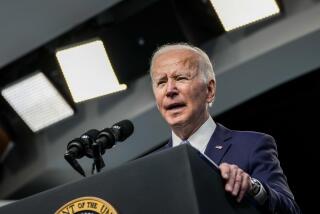Reagan Eases Conditions on Summit With Soviets : Prospect of Results No Longer Key
- Share via
WASHINGTON — White House spokesman Larry Speakes today said that the Reagan Administration is no longer insisting that a U.S.-Soviet summit hold the prospect of tangible results before the United States would agree to participate.
Raising the prospect of an early summit between President Reagan and new Soviet leader Mikhail S. Gorbachev, Administration officials said Reagan has broached the subject in a personal message Vice President George Bush will deliver Wednesday to Gorbachev.
Bush arrived in Moscow today as head of the U.S. delegation to the funeral of Soviet President Konstantin U. Chernenko, whose death was announced Monday. Bush said Reagan’s message called for an end to U.S.-Soviet conflict and “another beginning.”
Would ‘Weigh All Factors’
Spelling out the new Administration policy, Speakes said:
“If the opportunity presents itself, we would weigh all factors pro and con and then the President would make a decision of whether it would be beneficial to the cause of world peace to participate in a meeting with the Soviet leader.”
Today was the first time the Administration has said pointedly that the conditions for a U.S.-Soviet summit had changed.
Meeting ‘Whenever We Can’
As he concluded a meeting with Egyptian President Hosni Mubarak, Reagan was asked when he might meet with Gorbachev. “He has something to do right now,” the President quipped. On a more serious note, Reagan responded, “Whenever we can.”
“I have been willing to meet with their leaders since I’ve been here,” Reagan said. “And yes, I would look forward to a meeting with him.”
Deputy White House spokesman Robert Sims said a meeting with Gorbachev was being considered in a different light than was the case with the three other Kremlin leaders who have been in power during Reagan’s presidency.
“It’s not that our position has changed. It’s that the nature of their leadership has changed,” Sims said.
Relative Youth a Factor
One Administration official, while insisting there is no reason for “summit fever,” said that because of Gorbachev’s relative youth--he is 54--and changes that it could portend within the Soviet state, “meeting with him early on may be in our mutual interest.”
Speakes noted that the United States had once said a condition for any talks was that the Soviet Union’s deeds match its stated desire for peace. He said “that was once a part of a criteria that you have not heard stated recently.”
“At one time very early on, there was discussion about withdrawal from Afghanistan and other parts around the world.”
Speakes added, however, that “those things have not been in our rhetoric for some period of time.”
Improved Relations
Speakes said U.S.-Soviet relations had improved in recent months. “Certainly it does change--as our foreign policy friends are willing to say--the atmospherics.”
Speakes said “it is not the time to address” where a possible summit might be held. But he noted that since the 1970s there have been three U.S. visits by Soviet leaders, indicating that it might be time for a Soviet president to visit America.
Speakes said the last two summits, involving Presidents Gerald R. Ford and Jimmy Carter and Soviet President Leonid I. Brezhnev, were held on “neutral territory” in Finland and Austria.
More to Read
Get the L.A. Times Politics newsletter
Deeply reported insights into legislation, politics and policy from Sacramento, Washington and beyond. In your inbox twice per week.
You may occasionally receive promotional content from the Los Angeles Times.










